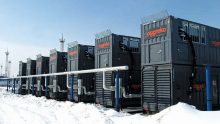Generally speaking, agriculture is rich in opportunities for clean, efficient energy self-generation and, more broadly and significantly, improvements at the nexus of energy, water and food production and use.
 The opportunities gain in significance as the climate changes, urbanization continues and people and families, whether by choice or necessity, continue to leave rural areas, farming and ranching to seek out new lives and livelihoods in cities and metropolitan areas.
The opportunities gain in significance as the climate changes, urbanization continues and people and families, whether by choice or necessity, continue to leave rural areas, farming and ranching to seek out new lives and livelihoods in cities and metropolitan areas.
Agriculture-clean energy entrepreneurs are capitalizing on the confluence of these trends amidst broad-based popular movements to produce food and energy locally, even in cities. Indoor Farms of America (IFOA) on Jan. 27 announced the latest iteration of its soon-to-be-released aeroponic “Container Farms” will be self-sufficient in terms of both energy and water.
Energy and Water-Efficient Indoor Farming
Incorporating IFOA’s patented food-grade aeroponic growing equipment, the Las Vegas, Nevada-based company’s aeroponic indoor “farms” are designed for use in totally enclosed, controlled growing environments and greenhouse operations.
Aeroponics entails growing plants without the use of soil or an aggregate growing medium. Akin to hydroponics and aquaponics, aeroponics uses less water. Reducing the cultivation method to its most basic level, plant’s are suspended and their roots and lower stems sprayed, or misted, with a water solution rich in nutrients.
In addition to being highly efficient in terms of use of space and water, the ability to control environmental conditions enables a much wider variety of high quality greens and fruits to be grown in any given climate/geographic area all year round.
IFOA’s vertical aeroponic equipment offers growing capacities in excess of 40 plants per square foot of floor space at an operating height of just 8 feet, according to the company. Modular and scalable, they can be configured as bi-level and multi-level vertical farms, a key selling point in densely populated urban areas where land is comparatively scarce and expensive. The company has also developed a mobile, “Farmers’ Market” version.
Growing Strawberries in New York – in Winter
Among its U.S. installations, IFOA recently installed an aeroponic “warehouse farm” in Salamanca, New York. Outdoor temperatures were around four degrees Fahrenheit (-15.56°C).
“The use of our patented mineral uptake system allows them to use rocks from the lands they own and speaks to their culture in meaningful ways, while lessening dependence on costly supplemental inputs into the system to yield food that tastes fantastic,” IFOA president Ron Evans explained.

Evans pointed out that the Salamanca, New York farm’s unnamed owners “are particularly focused on operating a very green farm.” That extends to energy.
The upstate New York farm employs geothermal heating, enabling high quality fruits and vegetables to be grown all year long. That includes strawberries, which the farm’s owners are just starting to grow.
Looking ahead, IFOA says it will be shipping multiple container farms internationally this spring. “We are continually humbled by the visits we receive to our facility in Las Vegas from the brightest people in agriculture. It is what drives us to keep making it better, to fulfill our purpose as a company,” company president Ron Evans said in a statement.






